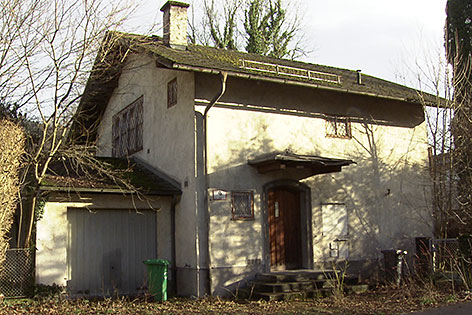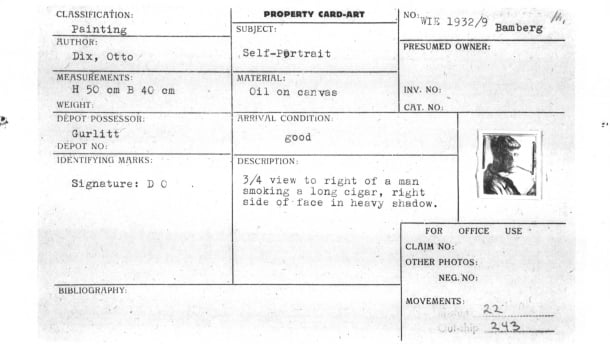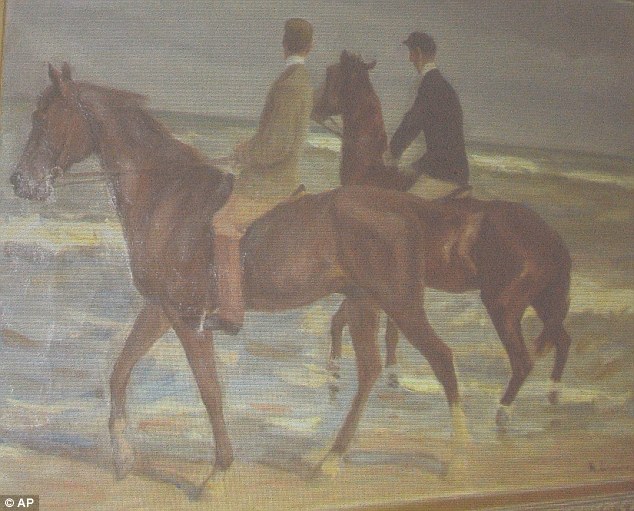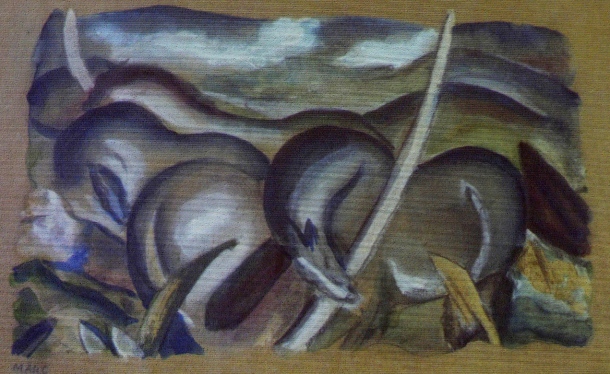There have been multiple and conflict reports in the last 48 hours about whether the Kunstmuseum Bern had reached a decision to accept the inheritance from and appointment as heir by Cornelius Gurlitt. Gurlitt, who died in early May shortly after reaching an agreement with the Bavarian prosecutor concerning the 1,280 works of art seized from his apartment on suspicion of Nazi-looting connections, unexpectedly named the Swiss museum as the sole beneficiary of his will, and as his heir and representative. Just last week, the news was that the Kunstmuseum had resolved to decide by late November, no later than six months after being advised of Gurlitt’s bequest.
Conflicting Reports About Possible Acceptance of Gurlitt Bequest by Kunstmuseum Bern
Topics: Reuters, Schwabinger Kunstfund, Hildebrand Gurlitt, Cornelius Gurlitt, Nazi-looted art, Gurlitt Collection, Tages Anzeiger, Munich, Christoph Schäublin, Restitution, Bavaria, Ruth Gilgen Hamisultane, World War II, Swiss, Austria, Sonntagszeitung, Kunstmuseum Bern, Berner Zeitung, Zürich, Nazi Raubkunst, Münchner Kunstfund
The Next Gurlitt? Records from Weinmüller Auction House Made Available Online
Among the many legacies of the Gurlitt saga is a renewed focus on the importance of Nazi-approved art dealers like Karl Haberstock to the expropriation, outlawing, and re-sale of art either owned by Jewish collectors or which was thematically disapproved by the Nazi state. Relatedly, it has served as a reminder of the often cursory review that many of these men received after the war, and the acceptance of their proffered explanations, like those of Hildebrand Gurlitt, that “everything was destroyed in a bombing attack.” Now, the German Central Institute for Art history is set to make public the records of Adolf Weinmüller and his eponymous auction house (later renamed Neumeister).
Topics: Meike Hopp, Schwabinger Kunstfund, Was einmal war, Hildebrand Gurlitt, Cornelius Gurlitt, Zentralinstitut für Kunstgeschichte, Lost Art Database, Schwabinger Taskforce, Gurlitt Task Force, Nazi-looted art, Gurlitt Collection, Karl Haberstock, Kende, Entartete Kunst, Munich, Restitution, Wien, World War II, degenerate art, www.lostart.de, München, Adolf Weinmüller, Neumeister Auction House, Aryanized, Sophie Lille, Unser Wien ‘Arisierung’ auf Österreich, Nazi Raubkunst, Vienna, Tina Walzer
Cornelius Gurlitt Attorney References “Only Eight Works” in Relation to Nazi Persecution, Likely More of an Update than Assertion of Ownership
The attorney for the recently deceased Cornelius Gurlitt, Stephan Edel, told Der Spiegel today that “At the present time, only eight works must be returned from the collection as a result of Nazi persecution,” (my translation). Edel went on to say “Whether further works will follow, must await the results of the ongoing research.”
Topics: Schwabinger Kunstfund, Hildebrand Gurlitt, Cornelius Gurlitt, www.Gurlitt.Info, Wolfgang Seybold, German museums, Nazi-looted art, Gurlitt Collection, Entartete Kunst, will contest, Curt Valentin, Restitution, Der Spiegel, World War II, Bunte, degenerate art, Kunstmuseum Bern, Nazi Raubkunst, Kunstfund München
Great-Nephew May Challenge Gurlitt Will and Appointment of Kunstmuseum Bern as Sole Heir, Second Will is Confirmed
When news first broke that Cornelius Gurlitt had named the Kunstmuseum in Bern as his sole heir (and not merely as the recipient of his art collection), we wondered whether some putative heir to Gurlitt—and thus to at least part of the art collection under suspicion for containing Nazi-looted art—might challenge that appointment.
Topics: Barcelona, Focus, Schwabinger Kunstfund, Hildebrand Gurlitt, Cornelius Gurlitt, Wolfgang Seybold, Nazi-looted art, Gurlitt Collection, Spain, Munich, Münchner Gerichtspräsident Gerhard Zierl, 60 Minutes, Restitution, ORF, codicil, testamentary capacity, World War II, Austria, Kunstmuseum Bern, Ekkeheart Gurlitt, probate, Nazi Raubkunst, CBS, Testament, Münchner Kunstfund, Morley Safer
Gurlitt Bequest to Kunstmuseum Bern: German Language Analysis Roundup
Discussion continues to swirl about how the passing of Cornelius Gurlitt this week will affect the review and possible return of the paintings found in his Munich apartment, and those in Austria. Not surprisingly, the majority of reflections on the news that Gurlitt appointed the Kunstmuseum in Bern, Swizterland as his sole heir are in German, Austrian, and Swiss publications. Here are is my roundup of the latest reports:
Topics: Neue Zürchner Zeitung, Schwabinger Kunstfund, Ingeborg Bergreen-Merkel, Stephan Holzinger, Bad Aussee, Cornelius Gurlitt, Monopol, Gurlitt Task Force, Germany, will, Nazi-looted art, Gurlitt Collection, Matthias Frehner, Entartete Kunst, Salzburg, Restitution, ORF, World War II, Switzerland, Süddeutsche Zeitung, heir, Austria, Kunstmuseum Bern, Washington Principles, Nazi Raubkunst, validity
Gurlitt Names Kunstmuseum Bern as Sole Heir. Will the Museum Want Everything that Comes with That?
Following confirmation by his attorney that Cornelius Gurlitt had left a will, it was further revealed yesterday that Gurlitt had not merely left his collection of paintings with substantial Nazi-looting questions to a museum outside Germany, but that he had named the Kunstmuseum Bern itself as his sole heir. The Kunstmuseum is the oldest museum in Switzerland, with more than 50,000 objects that include works by Vincent van Gogh, Franz Marc and Henri Matisse. The museum responded by releasing a statement that:
Topics: Schwabinger Kunstfund, Bad Aussee, Cornelius Gurlitt, Gurlitt Task Force, Germany, Nazi-looted art, Gurlitt Collection, Vincent Van Gogh, Entartete Kunst, Salzburg, Restitution, World War II, Switzerland, Austria, Franz Marc, Kunstmuseum Bern, Museums, Nazi Raubkunst, Henri Matisse
Secret Witness Contradicted Hildebrand Gurlitt’s Claim to Monuments Men that His Art was Burned in Dresden
From Dresden to Aschbach to Düsseldorf—New Scholarship in U.S. Archives Traces Hildebrand Gurlitt at War’s End, Could Affect Cornelius Gurlitt’s Claim to Good Faith Ownership
The Main Post has an article today (in German) by Christine Jeske tracing the late-war and post-war trajectory of Hildebrand Gurlitt and his now-infamous collection. The article is fascinating, and sheds considerable light on how the collection came through the war and how Gurlitt evaded greater scrutiny that might have revealed the trove’s whereabouts earlier. It also puts into context any claim Cornelius Gurlitt might now have to argue he took possession of the paintings from his father unaware of their provenance—what will be a critical argument, particularly if yesterday’s Cultural Property Restitution Law proposal by Bavaria becomes federal law in German.
Topics: Wiesbaden, Cultural Property Restitution Law, veschollene Kunst, Franken, Franconia, Hildebrand Gurlitt, Cornelius Gurlitt, George Clooney, Erik Berger, Augsburg, Dresden, Nuremberg, Fall Gurlitt, Monuments Men, Gurlitt Collection, Karl Haberstock, Kunstverein, Entartete Kunst, Munich, Heiner Dikreiter, Beutekunst, Freiherr Gerhard von Pölnitz, Bavaria, Kulturgut-Rückgewähr-Gesetz, Nürnberg, Düsseldorf, Schlüsselfeld, Monuments Fine Arts and Archives, Gemäldegalerie Dresden, Christine Jeske, Walter Paech, degenerate art, Städtische Galerie, München, Main Post, Karl and Magdalene Haberstock Foundation, Raubkunst, Verjährung, Nazi Raubkunst, Aschbach
German Museums Join in Demands for More Information About Gurlitt; Links to the Amber Room Theorized; Dix Painting Was Not Unknown
Der Spiegel reports today (link in German) about how German museums are joining the chorus of frustration about the lack of information about the Hildebrand and Cornelius Gurlitt collection find. From this perspective, this development is not a surprise. I was speaking to an international law class last night at Sarah Lawrence College, and one of the students asked me what the reaction in Germany would be. My feeling was that sooner rather than later, the German museum community, and likely the federal government, will push for a forward-looking solution. Present-day Germany takes questions about the Holocaust quite seriously, and for this collection to have turned up in Germany is sparking an embarrassment that could lead to more decisive action. The problem right now seems to be that everyone is waiting for someone else to make the first move.
Topics: Jeu de Paume, unbekannte Meisterwerke, February 13 1945, FAZ, Focus, Hildebrand Gurlitt, Dresden firebombing, Max Fisher, Cornelius Gurlitt, S. Lane Faison, Linz Führermuseum, Munich Central Collecting Point, Monopol, Wiesbaden Collecting Point, Dresden, HARP, Reinhard Nemetz, Max Liebermann, WWII, Monuments Men, Gurlitt Collection, Max Beckmann, Otto Dix, Degenerate Art: The Fate of the Avant-Garde in Naz, Auktionshaus Lempertz, Entartete Kunst, Fine Arts and Archives Program, Nazis, Marc Chagall, Organisation Todt, Paul Klee, Entdeckung verschollener Kunst, beschlagnahmte Bilder, Dresdner Bank, Belvedere, Fritz Todt, Holocaust Art Project, Hamburg Kunstverein, MFAA, Roberts Commission, Angela Merkel, Restitution, Wien, Monuments Fine Arts and Archives, Selbstporträt, World War II, degenerate art, Erben, Raubkunst-Bildern, Portrait of Wally, Washi, Löwenbändiger, Austria, Franz Marc, Oskar Kokoschka, Washington Principles, Ernst Ludwig Kirchner, München, Pablo Picasso, Dr. Herman Voss, Museums, Kristallnacht, Riders on the Beach, Hans Posse, Nazi Raubkunst, Vienna, Alfred Weidinger, Henri Matisse, Self Portrait, Emil Nolde
Focus Turns to Hildebrand Gurlitt’s Postwar Interrogation; Cornelius Gurlitt’s Whereabouts. Belvedere Official Questions Whether Collection Was Really a Secret
Topics: Jeu de Paume, unbekannte Meisterwerke, February 13 1945, FAZ, Focus, Hildebrand Gurlitt, Dresden firebombing, Max Fisher, Cornelius Gurlitt, S. Lane Faison, Linz Führermuseum, Munich Central Collecting Point, Monopol, Wiesbaden Collecting Point, Dresden, HARP, Reinhard Nemetz, Max Liebermann, WWII, Monuments Men, Gurlitt Collection, Max Beckmann, Degenerate Art: The Fate of the Avant-Garde in Naz, Auktionshaus Lempertz, Entartete Kunst, Fine Arts and Archives Program, Nazis, Marc Chagall, Organisation Todt, Paul Klee, Entdeckung verschollener Kunst, beschlagnahmte Bilder, Dresdner Bank, Belvedere, Fritz Todt, Holocaust Art Project, Hamburg Kunstverein, MFAA, Roberts Commission, Angela Merkel, Restitution, Wien, Monuments Fine Arts and Archives, World War II, degenerate art, Erben, Raubkunst-Bildern, Portrait of Wally, Washi, Löwenbändiger, Austria, Franz Marc, Oskar Kokoschka, Washington Principles, Ernst Ludwig Kirchner, München, Pablo Picasso, Dr. Herman Voss, Kristallnacht, Riders on the Beach, Hans Posse, Nazi Raubkunst, Vienna, Alfred Weidinger, Henri Matisse, Emil Nolde
Merkel Hints at Putting Gurlitt Lists Online, Calls for Special Tribunal Are Made
Catherine Hickley reports from Berlin that the government of Chancellor Angela Merkel is looking into ways to put lists and/or photographs online concerning the Cornelius Gurlitt seizure of roughly 1,400 paintings with connections to Nazi looting. This followed heavy complaints in the first days of the revelation, that the government had failed to identify what has been found. The biggest question remains why this remained a secret for roughly two years since the discovery. Merkel’s government claimed yesterday it learned of the find only in the last few months.
Topics: Stephanie Barron, Jeu de Paume, unbekannte Meisterwerke, Focus, Hildebrand Gurlitt, Theo Hermsen, S. Lane Faison, Linz Führermuseum, Munich Central Collecting Point, Wiesbaden Collecting Point, HARP, Max Liebermann, WWII, Monuments Men, Alt Aussee, Gurlitt Collection, Max Beckmann, Association for Research into Crimes Against Art, Monuments, Degenerate Art: The Fate of the Avant-Garde in Naz, Albrecht Dürer, Auktionshaus Lempertz, Entartete Kunst, Fine Arts and Archives Program, Nazis, Marc Chagall, Paul Klee, Entdeckung verschollener Kunst, beschlagnahmte Bilder, Holocaust Art Project, Judge Arthur Tompkins, Roberts Commission, Angela Merkel, Restitution, 1939 Galerie Fischer auction, World War II, degenerate art, Capt. Doubinsky, Los Angeles County Musuem of Art, Erben, Raubkunst-Bildern, Altmann v. Republic of Austria, Portrait of Wally, Löwenbändiger, Marc Masurovsky, Franz Marc, Oskar Kokoschka, Ernst Ludwig Kirchner, München, Pablo Picasso, ARCA, Lawyers' Committee for Cultural Heritage Preservat, Nazi Raubkunst, Henri Matisse, Emil Nolde






